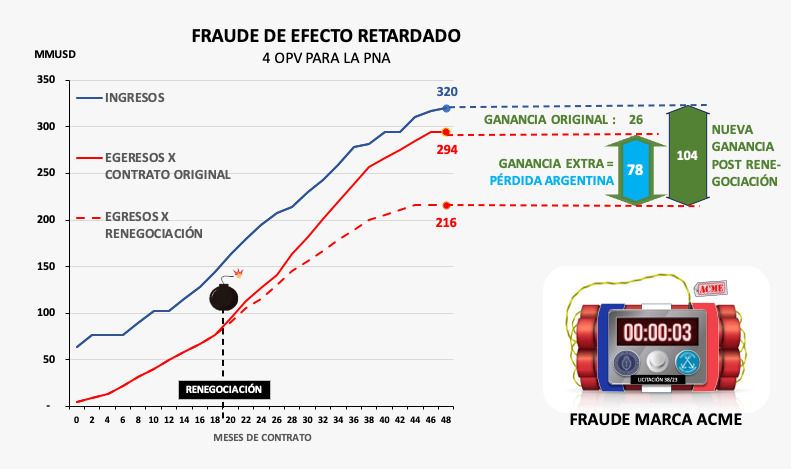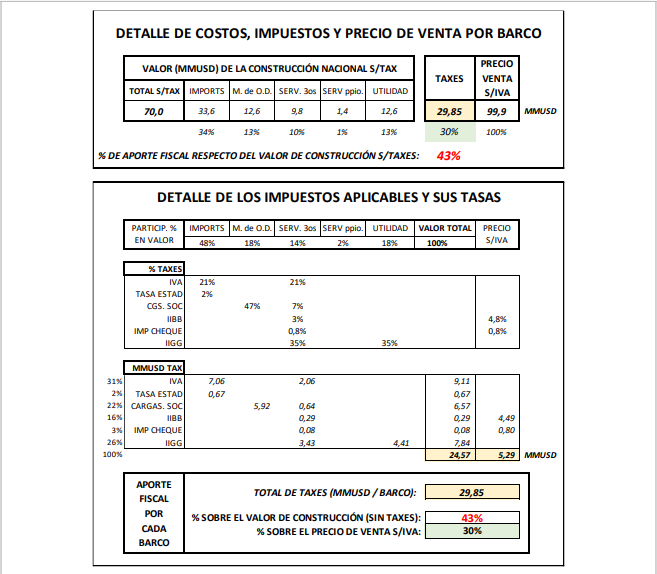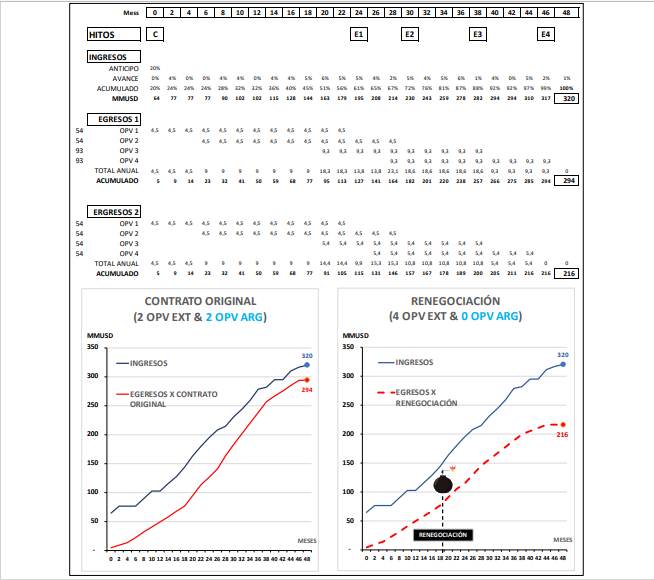En las últimas semanas recibí varios pedidos de ampliación de mi investigación sobre el fraude en la reciente licitación del Ministerio de Seguridad para comprar 4 barcos innecesarios (300 MMUSD) para la Prefectura Naval. Semanas atrás tuvo mucha repercusión la nota titulada “Un fraude de Prefectura devela corrupción en la Armada”, que apenas mostraba la punta del iceberg de este caso. Es por eso que decidí presentar otros detalles de esta estafa iniciada por el gobierno anterior y continuado en el actual, confirmando que los negociados y la depredación nacional no tienen banderías políticas.
Esto me obliga a spoilear un capítulo particularmente jugoso de mi próximo libro a punto de entrar en la etapa de edición final. No tuve más remedio que retrasarla –algo así, creo les ocurre a los guionistas de humor político, que encuentran en la Argentina una fuente inagotable de inspiración–. En ese próximo libro: CAIN. Relatos Salvajes de la Depredación Nacional, se presentarán, ficcionados, los resultados de mis investigaciones de varios, demasiados, casos reales de la depredación de los argentinos de a pie, a manos de sus propios hermanos, también argentinos, encaramados en las alturas del poder político, militar, sindical o empresarial.

El que nos ocupa hoy es un caso más de fratricidio naval, que tiene el componente morboso de permitirnos ser observadores online de un crimen en marcha.
Propongo empoderarnos para abandonar los cómodos roles de espectadores de este macabro reality nacional y saltar dentro de la pantalla para ser protagonistas a través de la denuncia en defensa propia. Sólo así podremos detener un nuevo crimen que nos roba miles de empleos, millonarios recursos y nos aleja el futuro; además perpetrado justamente por los funcionarios civiles y militares que se supone están en sus puestos para nuestra defensa y seguridad.
Hecha esta introducción, es momento de analizar brevemente el muy inconveniente pliego de la reciente licitación 038/2023, diseñado por el Ministerio de Seguridad de la Nación con el experto aporte de la Prefectura Naval.
El análisis de este caso de depredación nacional se divide en dos capítulos, según que el efecto del delito analizado se concentre en un daño inmediato o en uno de efecto retardado (tipo bomba de tiempo) muy superior en poder destructivo.
Fraude de Efecto inmediato.
Este fraude de efecto inmediato se materializaría el día mismo de la adjudicación de la licitación. Es muy obvio y surge del insólito método elegido por los funcionarios del Ministerio de Seguridad para definir al ganador de la licitación usando un sistema de adjudicación que utiliza dos criterios: uno técnico y uno económico.
El criterio técnico, según el Artículo 18 el pliego, aporta un 25% del puntaje de adjudicación y en su último renglón menciona que se le otorgarán 4 puntos al oferente que construya los 4 barcos en el país, lo que significa un mísero 1% de incentivo al desarrollo de la economía y el trabajo nacional por construcciones que por ley deberían hacerse en el país.
El criterio económico, que aporta el resto (75%) del puntaje de adjudicación, se concentra en el precio ofertado, pero allí exige un tratamiento diferenciado según donde se construyan los barcos. La “sutil” diferencia definida en el Artículo 5 del pliego indica lo siguiente:
- si el barco se construye en la Argentina, el precio se debe cotizar en condición DDP (Delivery Duty Paid), incluyendo absolutamente todas las tasas e impuestos nacionales (43% sobre el valor neto, según se detalla en el Anexo);
- pero si el barco se construye en el exterior, el precio se debe cotizar en condición DAP (Delivery At Place), quedando esa oferta mágicamente eximida de todos los impuestos nacionales, aun los de importación (!).
Así el diseño del pliego logra generar una insalvable ventaja a favor del astillero del exterior, y consecuente pérdida para los argentinos por partida doble ya que:
o no sólo se pierde el trabajo, desarrollo nacional y aporte fiscal,
sino que también,
o se pierde toda posible recaudación, aun sobre el barco importado.
Maquiavélico.

La aplicación de estos criterios está claramente expresada en las ofertas de la licitación, según figura en el portal oficial COMPRAR.GOB.AR y que se resumen aquí en forma simple:

Esta comparativa muestra que la construcción en el exterior y en el país tiene costos similares (60 vs. 70 MMUsd/u), al no considerarse los colosales impuestos argentinos. También muestra que, al hacerlos en el país, se recaudan unos 30 MMUSD/barco (Anexo 1), que se pierden al construirse en el exterior y facilitarles que ingresen al país libres de impuestos.
¿Que habrán pensado los genios del Ministerio de Seguridad y de la Prefectura cuando diseñaban este pliego y proyectaban estos números tan básicos como obvios? ¿Pueden ser tan incapaces de no haberse dado cuenta del daño que estaban haciendo a la Argentina? Cuesta creerlo.
El diseño del pliego licitatorio fraudulento tiene las siguientes consecuencias (y alguien debería pagar por ellas):
- Con tan colosal diferencia de ventajas entre la construcción nacional (1%) y extranjera (43%), la Prefectura se asegura que ningún oferente propondrá construir en la Argentina más que el mínimo “exigido” de 2 unidades.
- El extraño apoyo gremial a este proceso fraudulento facilita que se pierdan unos 4000 puestos de trabajo totales (directos e indirectos) durante el tiempo de construcción de las 2 unidades que, como mínimo, van a realizarse en el exterior en vez de hacerse en el país, gracias a nuestros sindicatos navales (!).
- Con este diseño de pliego, el Ministerio de Seguridad logra que los argentinos perdamos 120 MMUSD de aportes fiscales correspondientes a las unidades a construirse en el exterior en vez de hacerse en el país.
Fraude de Efecto retardado
El segundo fraude analizado aquí es de efecto retardado. Funciona con un mecanismo de relojería tipo bomba de tiempo y es tan grave aunque no tan obvio como el fraude anterior. Para entenderlo se requiere un ejercicio de proyección de la evolución del contrato que se presenta más adelante.

El diseño del pliego está pensado para que, promediando el contrato, se plantee la necesidad de una modificación que, supuestamente, conviene al Estado Nacional, pero que encierra una colosal estafa a los argentinos.
Algunos datos adicionales del pliego se presentan aquí para conocer las partes del mecanismo de relojería mortal de este fraude de efecto retardado:
- Obligación de construcción nacional parcial (2 unidades): En forma muy light el pliego presenta la exigencia mínima de construcción nacional de al menos dos unidades disfrazándola de una supuesta necesidad de transferencia tecnológica que, en realidad, es absolutamente innecesaria.
§ Esta obligatoriedad tan ambigua y sin ninguna garantía específica relevante se introdujo en el pliego a fin de allanar el camino al fraude futuro.
- Importaciones primero, construcciones nacionales después (quizás): Según el Artículo 24 del pliego, en los primeros 30 meses se deben entregar dos unidades importadas y en los 18 meses siguientes las dos nacionales.
§ En su momento se pidió la modificación de esta cláusula ya que 80 años de fraudes permanentes en la historia industrial naval demuestran que esto nunca se cumple, y la serie de los últimos barcos (nacionales) terminan cancelándose. Para evitar este obvio fraude potencial, se pidió incluir la exigencia de una garantía específica y de valor equivalente al de la pérdida nacional completa. Al respecto la PNA se comprometió, ante el Consejo Asesor de la Industria Naval, que el segundo y tercer barco serían construcciones realizadas en el país. Por supuesto, tal compromiso nunca se plasmó en el pliego ni se exigió la garantía correspondiente ya que eso atentaba contra una pieza clave del mecanismo de este fraude de efecto retardado.
- Forma de pago: Según el Artículo 30 del pliego, tras un 20% de anticipo de todo el contrato, se realizan pagos por avance de obra durante la construcción de cada barco. Así al entregarse la primera unidad, se debe haber cancelado, además del anticipo, un 25% del contrato, y así sucesivamente.
§ Esto parece muy lógico como sistema de pago pero la realidad es que, como se verá a continuación, deja al país en una gigantesca exposición ya que, una vez pagados los dos primeros barcos (50% contrato: 160 MMUSD), el saldo a cobrar (160 MMUSD) no cubre el costo de las construcciones faltantes (200 MMUSD), con lo cual existe una situación de riesgo absolutamente inaceptable y fácilmente detectable para cualquier funcionario de buena fe que revisara el pliego y supiese aritmética básica.
Cada una de estas cláusulas en sí mismas no aparentan generar ningún daño en forma aislada, pero como piezas de relojería que son, al funcionar dentro del mecanismo explosivo son mortales. Veamos, o mejor dicho, escuchemos el Tic, Tac, Tic, Tac … :
Una vez firmado el contrato el contratista extranjero cobra el anticipo del 20% establecido y recibe los pagos parciales de avance de los dos barcos que se van realizando en el exterior adelantándose al cronograma de construcción.
Promediando el contrato (mes 18 aproximadamente), y justo antes que el astillero argentino empiece con la obra del tercer barco se activa el detonador mortífero. ¡BUUUM! En ese momento el astillero nacional declara –convenientemente– que “no podrá cumplir” su parte del contrato generando “sorpresa y malestar” en la Prefectura y el Ministerio de Seguridad. Como solución, el astillero constructor externo ofrece hacerse cargo (sin costo adicional) de las entregas faltantes y, además, acortar los plazos totales. Todos los involucrados aplauden mientras se esfuman miles de puesto de trabajo y decenas de millones de dólares de recursos fiscales. Esta detonación causada por el muy oportuno retiro del astillero local aporta mágicamente 104 millones de soluciones a repartir entre los participantes.
Se genera un colosal aumento (400%) de la ganancia del astillero externo y una pérdida equivalente para la Argentina. Esto se debe a que las 2 construcciones nacionales que fraudulentamente se cancelan en la “renegociación” son las que iban a aportar el trabajo y recursos fiscales nacionales. Obviamente que todo esto fue planificado desde el principio en el diseño mismo del pliego al organizar este macabro mecanismo de estafa con efecto retardado. El Anexo 2 muestra el análisis detallado del flujo de fondos proyectado y a continuación se explica gráficamente el fraude implícito en la futura y segura renegociación.

Se observa que el ingreso total (línea azul) es de 320 MMUSD y el egreso total original (línea roja) estimado es de 294 MMUSD, resultando una ganancia razonable de 26 MMUSD. Esto generaría algo de trabajo en Argentina por la construcción de dos barcos que aportarían unos 60 MMUsd en recursos fiscales al país. No es lo que debiera ser, pues los cuatro barcos deberían construirse en el país, pero al menos sería algo.
Como se ve en el gráfico, tras la renegociación del mes 18, la curva de egresos (roja punteada) empieza a ser mucho más baja (pues no paga los impuestos argentinos) totalizando 216 MMUSD. Así, se cuadruplica (104 versus 26) la ganancia original del astillero extranjero. La nueva ganancia total de 104 MMUSD surgirá principalmente de la pérdida de aportes fiscales nacionales que sufrimos todos los argentinos, pero especialmente los más necesitados.
Aún estamos a tiempo de desactivar esta bomba que un grupo de malos funcionarios civiles y militares, junto a algunos sindicalistas y empresarios del sector naval han organizado desde el diseño mismo del pliego.
Conclusión
Se resumen aquí algunos de los aspectos salientes de este caso que, sin duda, deja muchas certidumbres de quienes son y cómo actúan los depredadores de la Argentina.
Hay ilegalidad de Origen. Por ley 27418 del 2017, los barcos para la Prefectura (PNA) deben construirse en la Argentina. Para habilitarse la construcción en el exterior, debería probarse que es imposible hacerlo en el país, cosa que nunca ocurrió pues no es cierto, y además queda demostrado en las ofertas presentadas que explicitan que 2 barcos se podrían hacer en el país.
Esta ilegalidad de origen de la licitación está probada en la denuncia CFP 1117/2024 B-21403 (Denunciante: Raúl E. Podetti), presentada en el Tribunal Federal en lo Criminal y Correccional # 1 a cargo de la Dra. Servini y que, actualmente investiga la Fiscalía No. 4 a cargo del Dr. Stornelli, que ha judicializado el proceso.
Es innecesario gastar 300 millones de dólares ahora, y menos en 4 barcos patrulleros iguales a los otros cuatro que ya se compraron en 2018 y que prácticamente nunca se han usado desde el 2020 en que llegó el primero.
Se devela la corrupción en la compra de la Armada de 2018. En aquel momento, la Armada pagó el doble del precio de mercado por casi idénticos barcos ahora licitados por Prefectura. Esa estafa se logró al hacerse una compra directa al mismo astillero estatal francés que hoy, al tener que competir en una licitación, ofrece la mitad de precio por esos barcos. Y además, en este caso, los barcos son algo mayores, todos nuevos, con mayor financiamiento y con la “promesa de construcción nacional”.
El astillero preferido de Prefectura y la Armada es el más corrupto del mundo. Las investigaciones del Fletcher Institute de la Universidad de Tufts en su Compendum of Arms Trade Corruption, indican que el astillero estatal francés, preferido de ARA y PNA, acumula unos 1000 MMUSD en sobornos encubiertos con asesinatos con casos en Pakistán, Taiwan, Arabia, Malasia y Brasil.
La Prefectura suele hacer fraude en sus compras navales. Históricamente, los 40 barcos nuevos adquiridos por Prefectura fueron importaciones sospechadas e innecesarias por haber sobradas capacidades locales competitivas. El último caso, en 2017, fueron 5 lanchas patrulleras compradas en Israel al doble del precio de mercado como se probó en la causa CFP 3978/2022 (denunciante: Raúl E. Podetti) a través de la Oficina Anticorrupción, que se tramita en el Juzgado en lo Criminal y Correccional Federal #3 del Dr. Rafecas, sobre el cual se interesó también la Auditoría General de la Nación que investigaba otros fraudes similares de armas de origen de Israel compradas a través del mismo Ministerio y con la intervención del mismo conocido y “habitual dealer de la casa”.
El diseño del pliego incluye un gran fraude en dos etapas. Como se detalló más arriba, el pliego incluye un sistema perverso de valuación de las ofertas nacionales para favorecer obscenamente a las construcciones extranjeras con criterios muy inconvenientes para el interés nacional. Pero lo peor es que hay otra estafa organizada con efecto retardado de dimensión colosal, que permite que el contratista extranjero cuadruplique su ganancia con la resignación extra de 60 MMUSD y 4000 puestos de trabajo por parte de los argentinos para favorecer al contratista externo.
Hay que lograr que esta licitación se anule cuanto antes. Y, además, que se realice una investigación que haga pagar a los delincuentes que organizaron estas estafas, y a los que las facilitaron mediante su participación, por ejemplo, en el Consejo Asesor de la Industria Naval.
(*) Raúl Podetti es ingeniero naval (ITBA), MSE (U. of Michigan) y MBA (IAE). En el campo naval fue emprendedor industrial, funcionario y dirigente empresario. Es consultor, profesor de postgrado, miembro del Vector Naval de la UBA, director de la Colección Azul (www.raulpodetti.com), y autor de L´Affaire Argentine, Historias de Corrupción Naval Militar. Contacto: [email protected]
ANEXO 1
El siguiente análisis se basa en las ofertas de la licitación, en el sistema tributario argentino y en la habitual distribución de costos de un barco del tipo del OPV construido en un astillero nacional. Del mismo surge que el aporte fiscal de la construcción nacional es del 43% sobre el precio sin impuestos.

ANEXO 2
El desarrollo de este contrato con sus hitos principales indica los Ingresos y los Egresos asumiendo que los Egresos del barco importado son 54 MMUSD/u (10% utilidad). Para el caso nacional los Egresos se computan sumando: a) los impuestos de 30 MMUSD/u y b) 90% del Precio sin impuestos (70 x 90% = 63 MMUSD/u), generando un Egreso total de 93 MMUSD/u. La línea de Egresos 1 corresponde al del Contrato Original, mientras que Egresos 2 representa el de la renegociación fraudulenta planteada en el mes 18 aproximadamente.







